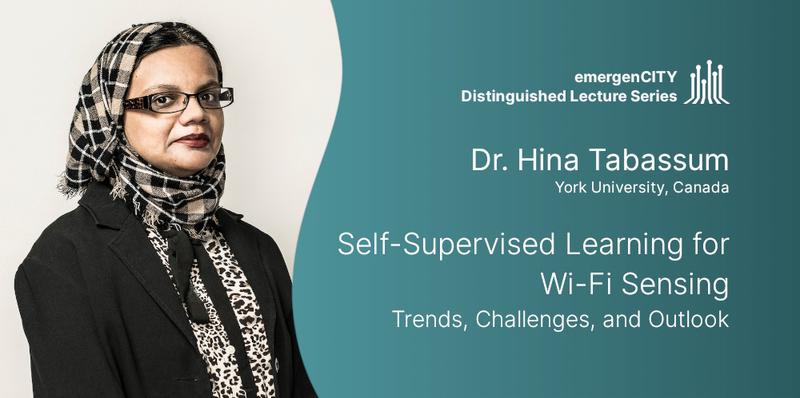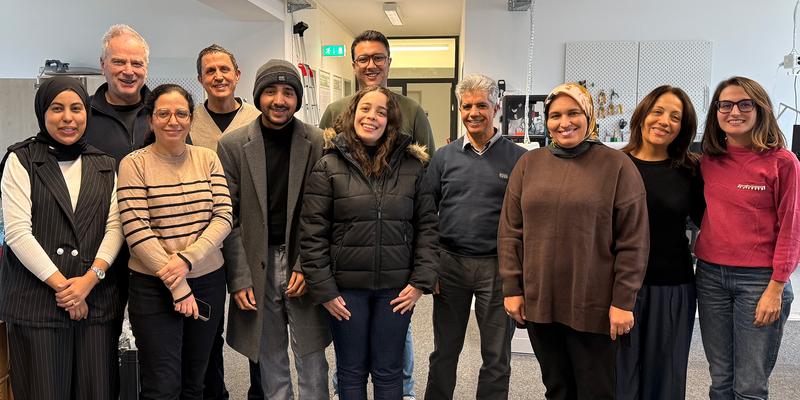Vahid Jamali, emergenCITY professor for Resilient Communication Systems, hosts the renowned Hina Tabassum, Associate Professor at York University in Toronto, Canada, for a Distinguished Lecture on September 1st at TU Darmstadt. In her talk, she is going to elaborate the possibilities and limits of using Wi-Fi signals to sense the environment.
Title: “Self-Supervised Learning for Wi-Fi Sensing: Trends, Challenges, and Outlook”
Speaker: Hina Tabassum, York University in Toronto, Canda
Date: 1st September, 10 am
Venue: Building S3|20, Room 111, TU Darmstadt
(Rundeturmstr. 10, 64283 Darmstadt) + online via Zoom
Registration for on-site participation
The event will take place online as well as in person. Since we have a limited capacity of seats, we kindly ask you to register here, if you want to take part in person.
About the Lecture
Wi-Fi sensing leverages channel state information (CSI) and received signal strength indicator (RSSI) measurements to enable applications such as human activity recognition, localization, and vital signs monitoring, while benefiting from existing Wi-Fi infrastructure. This talk begins with an overview of Wi-Fi sensing fundamentals, CSI extraction, and deployment challenges, including domain sensitivity, computational constraints on edge devices, and the scarcity of labeled data. We will then explore RSCNet, a dynamic CSI compression framework for cloud-based sensing that reduces device resource requirements by up to 99.7% while maintaining high recognition accuracy.
The discussion will also highlight CAPC (Context-Aware Predictive Coding), a self-supervised learning (SSL) framework for CSI representation learning, which integrates contrastive and non-contrastive methods with novel dual-view augmentations to improve generalization across environments. Comparative evaluations show that CAPC outperforms existing approaches, especially in label-limited settings. The talk concludes with emerging directions combining cloud computing and SSL to overcome resource and data constraints, paving the way for robust, scalable Wi-Fi sensing solutions.
About the Speaker
Hina Tabassum (Senior Member, IEEE) received the Ph.D. degree from the King Abdullah University of Science and Technology, Thuwal, Saudi Arabia. She is currently an Associate Professor with the Lassonde School of Engineering, York University, Toronto, where she joined as an Assistant Professor in 2018. She was appointed as a Visiting Faculty with University of Toronto, Toronto, ON, Canada, in 2024, and the York Research Chair of 5G/6G-enabled mobility and sensing applications in 2023, for five years. She has coauthored more than 120 refereed articles in well-reputed IEEE journals, magazines, and conferences. Her current research interests include multi-band 6G wireless communications and sensing networks, connected and autonomous systems, AI-enabled network mobility, and resource management solutions.
Hina Tabassum has been selected as the IEEE ComSoc Distinguished Lecturer for the term 2025–2026 and is listed in Stanford’s list of the World’s Top Two-Percent Researchers in 2021–2024. She received the Lassonde Innovation Early-Career Researcher Award in 2023 and was appointed as N2Women: Rising Stars in Computer Networking and Communications in 2022. She was the Founding Chair of the Special Interest Group on THz communications in the IEEE Communications Society–Radio Communications Committee. Currently, she is serving as an Area Editor of the IEEE Open Journal of the Communications Society and IEEE Communications Surveys and Tutorials as well as an Associate Editor for IEEE Transactions on Communications, IEEE Transactions on Mobile Computing, and IEEE Transactions on Wireless Communications.



